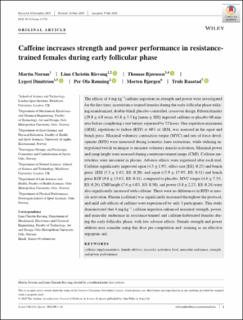Caffeine Increases Strength and Power Performance in Resistance-trained Females During Early Follicular Phase
Norum, Martin; Risvang, Linn; Bjørnsen, Thomas; Dimitriou, Lygeri; Rønning, Per Ola; Bjørgen, Morten; Raastad, Truls
Peer reviewed, Journal article
Published version
Permanent lenke
https://hdl.handle.net/11250/2725795Utgivelsesdato
2020Metadata
Vis full innførselSamlinger
- Artikler / Articles [2119]
- Publikasjoner fra Cristin [1107]
Originalversjon
Scandinavian Journal of Medicine & Science in Sports. 2020, 30(11), 2116-2129. 10.1111/sms.13776Sammendrag
The effects of 4 mg·kg−1caffeine ingestion on strength and power were investigated for the first time, in resistance‐trained females during the early follicular phase utilizing a randomized, double‐blind, placebo‐controlled, crossover design. Fifteen females (29.8 ± 4.0 years, 63.8 ± 5.5 kg [mean ± SD]) ingested caffeine or placebo 60 minutes before completing a test battery separated by 72 hours. One‐repetition maximum (1RM), repetitions to failure (RTF) at 60% of 1RM, was assessed in the squat and bench press. Maximal voluntary contraction torque (MVC) and rate of force development (RFD) were measured during isometric knee extensions, while utilizing interpolated twitch technique to measure voluntary muscle activation. Maximal power and jump height were assessed during countermovement jumps (CMJ). Caffeine metabolites were measured in plasma. Adverse effects were registered after each trial. Caffeine significantly improved squat (4.5 ± 1.9%, effect size [ES]: 0.25) and bench press 1RM (3.3 ± 1.4%, ES: 0.20), and squat (15.9 ± 17.9%, ES: 0.31) and bench press RTF (9.8 ± 13.6%, ES: 0.31), compared to placebo. MVC torque (4.6 ± 7.3%, ES: 0.26), CMJ height (7.6 ± 4.0%, ES: 0.50), and power (3.8 ± 2.2%, ES: 0.24) were also significantly increased with caffeine. There were no differences in RFD or muscle activation. Plasma [caffeine] was significantly increased throughout the protocol, and mild side effects of caffeine were experienced by only 3 participants. This study demonstrated that 4 mg·kg−1 caffeine ingestion enhanced maximal strength, power, and muscular endurance in resistance‐trained and caffeine‐habituated females during the early follicular phase, with few adverse effects. Female strength and power athletes may consider using this dose pre‐competition and ‐training as an effective ergogenic aid.
Beskrivelse
This is an open access article under the terms of the Creative Commons Attribution License, which permits use, distribution and reproduction in any medium, provided the original work is properly cited.
